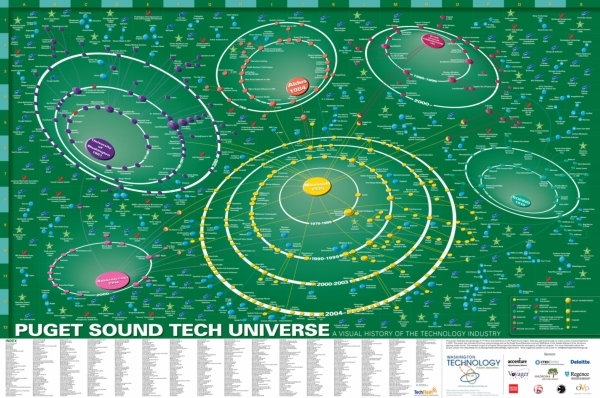Puget Sound Tech Universe map depicts results of professor's study on history of high tech companies in Seattle

Six key organizations have provided the foundation for numerous technology companies that have surfaced in Seattle over the past three decades.
This was a major finding of a year-long study, Visualizing the Puget Sound Technology Universe, conducted by Heike Mayer, associate professor, urban affairs and planning, and co-director of the Metropolitan Institute, Virginia Tech National Capital Region. The results of the study are depicted visually on a map with a solar system design that documents the history of the Puget Sound technology industry and depicts the genealogy of 711 companies, institutions, and organizations.
Mayer and a team of researchers and industry experts from the Puget Sound region and from Seattle University conducted the study for the Washington Technology Industry Association (WTIA), North America’s largest statewide association of technology companies, information technology departments, and individual technology professionals.
Depicted as “suns” on the map, the six companies that built the foundation of the local tech industry are Microsoft, Aldus Corporation, University of Washington, Boeing, McCaw Cellular, and Amazon.com. “Planets” revolving around the “suns” are companies founded by entrepreneurs with experience at one of the “sun” companies before leaving to start something new. The map also depicts “comets” or startups that fall outside the orbit of the six big players, and also includes signs for key connection-maven organizations, including the WTIA and venture capital firms.
“It’s clear that a handful of foundational companies and research institutions made an enormous impact on the state’s economy,” said Ken Myer, president and chief executive officer of the WTIA. “The entrepreneurs who populated this galaxy and the venture capitalists and service providers who support them have created the robust technology industry we see today.”
An interactive version of the Puget Sound Tech Universe map can be found on the Washington Technology Industry Association website (http://www.washingtontechnology.org/TechPoster) and poster copies are also available for purchase from the WTIA.
Other findings in Mayer’s study include
- 73 percent of startups have expanded into new markets, resulting in a diverse mix of technology companies in Seattle: software, aerospace, wireless, and internet.
- The average tech company responding to the survey had 2.3 founders. Almost half (46 percent) had serial entrepreneurs.
- About half of the respondents had a research and development or technical background.
- Most of the new tech company founders were driven to start their own company by an entrepreneurial spirit or the desire to be their own boss and reap the rewards of their efforts. Financial security and frustration with previous employers were also cited as driving forces.
- Slightly more than half (51 percent) of the companies were financed through bootstrapping (personal finances, friends, and family); 19 percent were backed by angels, and 15 percent used venture capital.
- Research – through the University of Washington and foundational firms such as Microsoft and Boeing – played an important role in fostering a successful tech community in Seattle, evidenced by numerous successful companies created by ex-students and employees of both organizations.
Mayer conducted her doctoral dissertation with a similar visual analysis of the universe of tech companies in the Portland, Ore., area, and in 2008, she completed a similar map for the Portland, Ore., and the Boise, Idaho, regions. (Myer contacted Mayer on behalf of the WTIA after he saw the Boise map.) “Seattle was significantly different because there were six foundational companies,” said Mayer. “In my previous studies I traced the roots of technology to only two companies in each city. In Portland’s case it was Tektronix and Intel; in Boise, it was Hewlett-Packard and Micron Technology.”
Data for Mayer’s Visualizing the Puget Sound Technology Universe study was gathered through an online survey and from secondary sources such as the Puget Sound Business Journal’s Book of Lists, a Seattle Startup 2.0 list, and an Xconomy gaming cluster analysis published in 2008.
The study was sponsored by Accenture, Deloitte, F5Networks, Madrona Venture Group, OVP Venture Partners, Physio Control, Regence Blue Shield, University of Washington Computer Science and Engineering, Voyager Capital LLC, and the Washington State Department of Community, Trade and Economic Development.
Mayer is currently collecting data to visualize startup dynamics in Phoenix, Ariz, and Kansas City, Mo., a continuation of her Knowledge Regions Initiative at Virginia Tech to explore the urban and regional development implications of emerging innovative and entrepreneurial industries.



.jpg.transform/m-medium/image.jpg)
